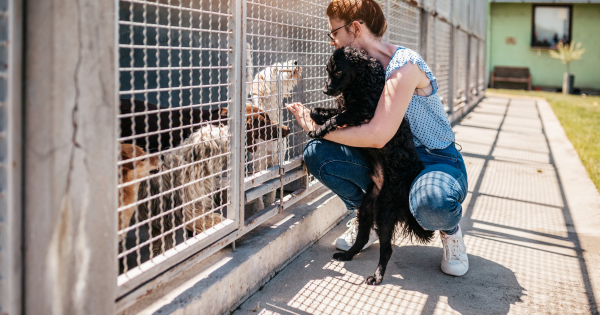Deciding to bring a dog into your life is an exciting and meaningful choice, but one of the most important decisions you’ll make is where to get your new companion. While many people consider buying a dog from a breeder, adopting from a shelter or rescue organization is often a far more beneficial and compassionate option. In this article, we’ll explore the key reasons why adopting a shelter dog is the better choice for you, the dog, and the community.

1. Saving a Life
One of the most compelling reasons to adopt a shelter dog is the opportunity to save a life. Millions of dogs end up in shelters across the U.S. every year, and unfortunately, many of these dogs are at risk of being euthanized due to overcrowding and limited resources. By choosing to adopt, you give a dog a second chance at a happy life, helping to reduce the number of homeless animals in need.
Key Facts:
- Over 3 million dogs enter shelters each year in the U.S.
- Around 670,000 shelter dogs are euthanized annually due to lack of space and resources.
- Adopting from a shelter directly saves a dog from an uncertain fate.

2. Supporting Ethical Pet Ownership
When you adopt a dog from a shelter, you are supporting ethical pet ownership practices. Unfortunately, many breeders, particularly those associated with puppy mills, prioritize profit over the health and well-being of the animals. Puppy mills often keep dogs in deplorable conditions, with little attention to their health, socialization, or quality of life.
By choosing a rescue dog over purchasing from a breeder, you stand against the unethical treatment of animals and help fight the inhumane puppy mill industry.
Puppy Mill Red Flags:
- Dogs are kept in small, unsanitary cages with little social interaction.
- Breeding practices are often unsafe and focused on quantity over quality.
- Puppies are often sold online or through pet stores with little oversight.
3. Lower Costs
Adopting a dog from a shelter is significantly more affordable than buying from a breeder. Most shelters charge a modest adoption fee that typically includes spaying or neutering, vaccinations, and sometimes even a basic health check. In contrast, dogs from breeders can cost hundreds to thousands of dollars, depending on the breed and pedigree.
Cost Comparison:
- Adoption Fees: Typically range from $50 to $300, often including medical care.
- Breeder Prices: Can range from $500 to over $3,000, with additional costs for vaccinations, spaying/neutering, and health checks.
Adopting from a shelter not only saves you money upfront but also supports shelters in their mission to care for more animals in need.
4. Wide Variety of Dogs
Contrary to popular belief, shelters offer a wide variety of dog breeds, ages, and temperaments. Whether you’re looking for a purebred dog or a lovable mixed breed, there’s a good chance you’ll find the perfect match at a shelter. Additionally, adopting from a shelter gives you the opportunity to meet dogs of different ages, sizes, and personalities, allowing you to choose the right fit for your lifestyle.
Common Misconceptions About Shelter Dogs:
- “Only mixed breeds are available”: Shelters often have purebred dogs as well.
- “All shelter dogs have behavioral issues”: Many shelter dogs are loving, well-behaved, and eager for a second chance.
- “There aren’t any puppies”: Puppies are regularly available for adoption in shelters.

5. Fewer Health Problems
Many purebred dogs are prone to genetic health issues due to years of inbreeding. For example, breeds like Bulldogs, German Shepherds, and Pugs often face health problems related to their specific breed traits, such as breathing difficulties, hip dysplasia, or joint issues.
On the other hand, mixed-breed dogs, commonly found in shelters, tend to have fewer genetic health problems. This is because their diverse genetic makeup reduces the likelihood of inherited diseases, potentially leading to longer, healthier lives.
Examples of Breed-Specific Health Issues:
- Bulldogs: Prone to respiratory problems.
- German Shepherds: Susceptible to hip dysplasia.
- Dachshunds: High risk of spinal issues.
Choosing a shelter dog, especially a mixed breed, may reduce the chances of dealing with costly and heartbreaking health problems down the road.

6. Adult Dogs Come Pre-Trained
Another advantage of adopting a shelter dog is that many adult dogs are already house-trained and familiar with basic commands. Training a puppy from a breeder can be time-consuming, and many new dog owners underestimate the effort required to house-train, socialize, and teach commands to a young puppy.
When you adopt an adult dog from a shelter, they often come with a known temperament, and shelter staff can inform you about their behavior, training needs, and energy levels. This makes it easier to find a dog that fits your lifestyle and home environment.
Benefits of Adopting an Adult Dog:
- Less time spent on house-training and basic obedience.
- Known temperament and energy levels.
- Fewer surprises compared to raising a puppy from scratch.

7. Contributing to the Solution
Adopting a shelter dog helps address the broader issue of pet overpopulation and homelessness. Every time a dog is adopted, a space opens up in the shelter, allowing them to rescue more animals. Additionally, by adopting instead of buying, you reduce the demand for commercially bred dogs, which often perpetuate unethical breeding practices.
Supporting shelters and rescue organizations contributes to a cycle of compassion and care for animals in need. It helps create a more humane society where animals are treated with respect and given the opportunity to find loving homes.

8. Emotional Rewards
There’s something incredibly rewarding about knowing you’ve given a dog a second chance at life. Rescue dogs often form deep emotional bonds with their adopters, as they recognize the kindness and love they’ve been shown. Many adopters find that their shelter dogs are not only loyal companions but also have a unique ability to sense and return the compassion they’ve received.
The emotional connection between a rescued dog and their owner can be deeply fulfilling, offering both parties a sense of purpose, love, and joy.

When comparing shelter dogs to breeder dogs, the choice to adopt becomes clear. By adopting from a shelter, you save a life, support ethical practices, and often end up with a loyal and loving companion. While breeders may offer specific breeds or puppies, the benefits of rescuing a dog from a shelter far outweigh the costs.
The next time you’re considering adding a dog to your family, remember: adopt, don’t shop. You’ll be making a difference not just in the life of one dog, but in the broader effort to reduce homelessness and promote responsible pet ownership.
